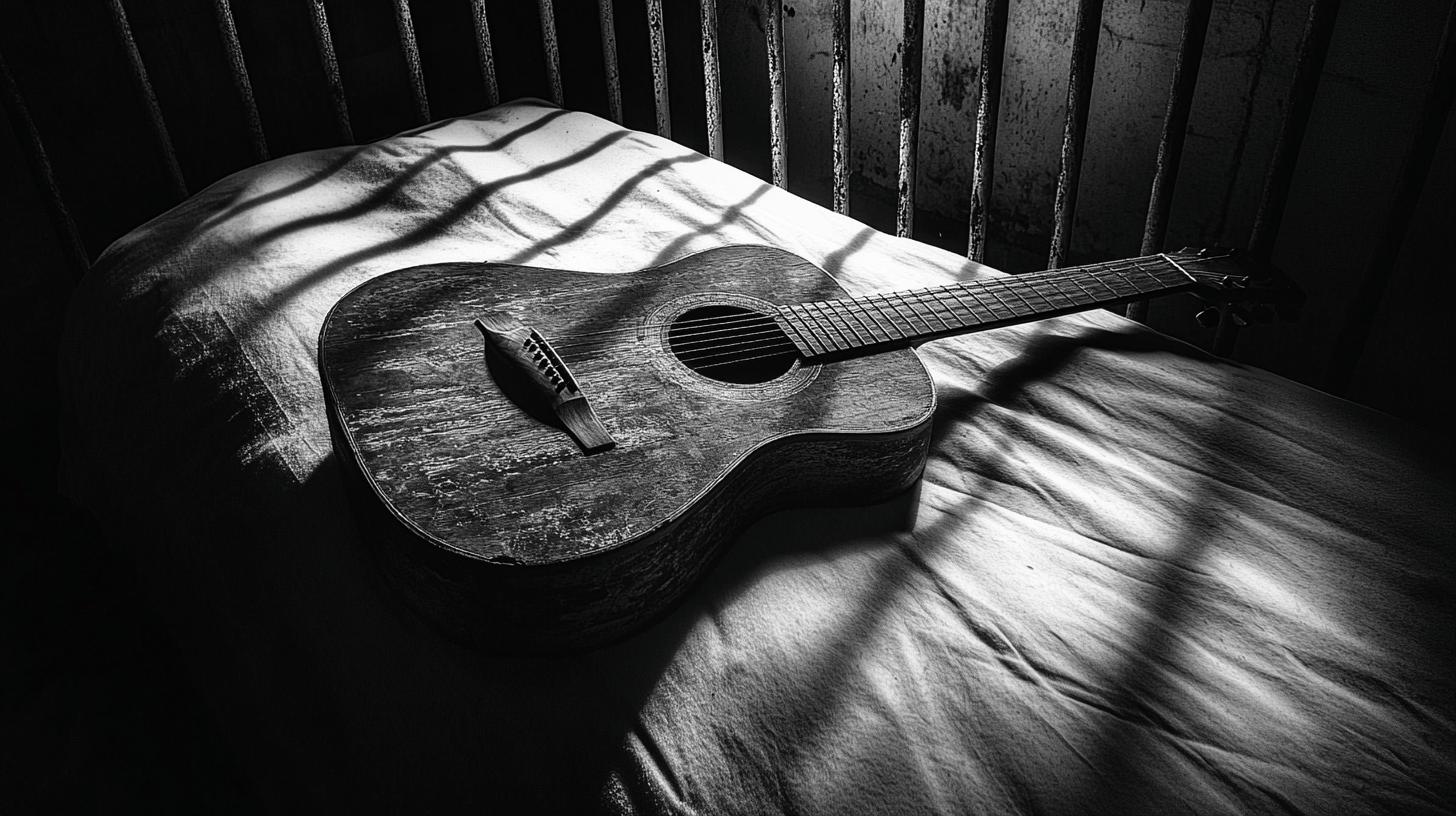Can music about incarceration truly transcend its context to highlight broader societal issues? "Songs About Prison: Iconic Tracks and Their Impact" explores this fascinating dynamic by examining how some of the most celebrated songs tackle themes of confinement and injustice.
From Johnny Cash’s evocative "Folsom Prison Blues" to Bob Dylan’s potent narrative in "Hurricane," these tracks encapsulate the complex realities of life behind bars. The blog delves into the profound cultural significance of these songs, revealing their ability to resonate beyond the prison walls and inspire change.
Iconic Songs about Prison: A Musical Exploration
![]()
Johnny Cash’s "Folsom Prison Blues" stands as a landmark in music history. The song brings the harsh realities of incarceration to life, painting a vivid picture of a prisoner’s remorse and longing for freedom. Cash’s empathetic portrayal of the prison environment resonated with audiences, bringing attention to the human aspects of life behind bars.
His live performance at Folsom Prison in 1968 amplified the song’s impact, showcasing Cash’s unique ability to connect with marginalized individuals. This performance not only strengthened Cash’s reputation as an artist who understood and cared for the incarcerated but also elevated the song to iconic status within popular culture.
Bob Dylan’s "Hurricane" offers a powerful commentary on racial injustice and the wrongful imprisonment of Rubin "Hurricane" Carter, a professional boxer. The song highlights the systemic racism within the American justice system, serving as a poignant reminder of the prejudices that can affect legal outcomes.
Dylan’s storytelling, combined with his passionate delivery, brought Carter’s case into the public eye, demonstrating the potential of music to influence social consciousness and inspire change. This track remains a testament to the power of songwriting in addressing critical societal issues and advocating for justice and reform.
Elvis Presley’s "Jailhouse Rock" provides a contrasting perspective, celebrating rebellion and freedom within the prison context. Its upbeat tempo and energetic performance transformed the song into a cultural phenomenon, contributing to the rock and roll movement of the 1950s.
The track’s portrayal of prison life is more theatrical than realistic, emphasizing the liberating spirit of music and dance even within confinement. Presley’s performance in the film of the same name cemented "Jailhouse Rock" as a symbol of youthful defiance and has left a lasting legacy in both music and film.
-
"Folsom Prison Blues" by Johnny Cash: Captures the somber reality of incarceration.
-
"Hurricane" by Bob Dylan: Focuses on racial injustice and wrongful imprisonment.
-
"Jailhouse Rock" by Elvis Presley: Celebrates rebellion and freedom within the prison context.
Rap and Hip-Hop: Narratives of Incarceration

Rap and hip-hop have long served as platforms for addressing the harsh realities of incarceration, often highlighting systemic injustices and the personal toll of prison life. These genres provide a voice for marginalized communities, using storytelling to shed light on the struggles faced by individuals within the justice system. Through powerful lyrics and compelling narratives, artists explore themes ranging from personal redemption to societal critique.
Nas: “One Love”
Nas’ "One Love" stands out for its poignant portrayal of personal connections and solidarity with friends behind bars. The song is crafted as a letter to an incarcerated friend, mixing updates from the outside world with messages of encouragement and support.
Nas’ introspective lyrics emphasize loyalty and hope, illustrating the emotional impact of incarceration on those left behind. This track underscores the enduring bonds of friendship and the importance of maintaining communication amidst adversity.
Snoop Dogg: “Murder Was The Case”
Snoop Dogg’s "Murder Was The Case" delves into a narrative of crime and redemption. The song describes a fictional account of Snoop’s near-death experience and subsequent spiritual awakening.
Through vivid storytelling, Snoop explores themes of morality, faith, and transformation, depicting a journey from street life to spiritual contemplation. The track’s introspective nature and haunting production highlight the complexities of redemption, capturing the tension between past actions and the hope for a better future.
Public Enemy: “Black Steel in the Hour of Chaos”
Public Enemy’s "Black Steel in the Hour of Chaos" offers a searing critique of the American justice system. The song narrates the story of a draft dodger’s imprisonment and a subsequent jailbreak, symbolizing resistance against systemic oppression.
With its aggressive delivery and powerful imagery, the track captures the frustration and anger felt by those unfairly targeted by the system. Public Enemy’s sharp social commentary and dynamic production make this song a compelling anthem of defiance and rebellion.
Country and Blues: Tales of Jail Life and Redemption

Country and blues music have long served as powerful vehicles for storytelling, particularly in addressing the complexities of jail life. Historically, both genres have roots intertwined with the experiences of marginalized communities, who used music as an expressive outlet for their challenges and aspirations.
The blues, emerging from African American communities, often depicted the stark realities of life, including the experiences of incarceration and labor camps in the Jim Crow era. Country music, with its origins in the rural South, similarly captured the narratives of hardship and resilience, often reflecting the lives of those on society’s fringes.
A recurring theme in these songs is the juxtaposition of despair and hope. For example, Merle Haggard’s "Life in Prison" delves into the grim reality of crime and punishment, reflecting Haggard’s own history of incarceration.
The song explores themes of regret and the irreversible consequences of one’s actions. In contrast, Leadbelly’s "Midnight Special" offers a message of hope and liberation, symbolized by the train’s light heralding freedom.
This symbolic use of trains in blues music underscores the longing for escape and redemption, a theme that resonates deeply within the genre. Similarly, Bukka White’s "Parchman Farm Blues" portrays the grueling labor conditions faced by convicts, highlighting the resilience of the human spirit amidst adversity.
The emotional impact of these songs lies in their raw honesty and vivid storytelling. They provide listeners with a glimpse into the personal struggles and emotional turmoil of those incarcerated, fostering empathy and understanding.
The authenticity of the artists’ backgrounds adds depth to their narratives, as many drew from personal experiences, lending credibility and resonance to their music. Through the lens of country and blues, the stories of jail life become not only tales of suffering but also of hope and redemption, reminding listeners of the enduring human spirit.
| Song Title | Theme | Artist Background | Musical Style |
|---|---|---|---|
| “Life in Prison” | Crime & Punishment | Merle Haggard was a former inmate | Traditional Country |
| “Midnight Special” | Hope & Freedom | Leadbelly was a former convict | Folk Blues |
Rock Anthems and the Spirit of Rebellion

Rock music has always been synonymous with rebellion, and its approach to themes of imprisonment and escape reflects this spirit. The genre often channels a sense of defiance and liberation, using powerful instrumentation and evocative lyrics to explore the complexities of confinement and the yearning for freedom.
-
"Jailbreak" by Thin Lizzy: A high-energy escape narrative.
-
"Rusty Cage" by Soundgarden: Expresses the desire to break free from constraints.
Thin Lizzy’s "Jailbreak" captures the essence of a daring escape with its driving guitar riffs and energetic tempo. The song’s narrative revolves around the thrill and urgency of breaking free, mirroring the raw and unfiltered emotions often associated with rock music.
The use of vivid imagery, coupled with a relentless beat, creates an atmosphere of tension and excitement, drawing listeners into the story of rebellion and liberation.
Soundgarden’s "Rusty Cage" explores themes of entrapment and the struggle to break free, both physically and metaphorically. The track employs heavy guitar work and intense vocals to convey a sense of urgency and desperation.
The imagery of a "rusty cage" serves as a powerful metaphor for constraints, resonating with listeners who have felt trapped in their circumstances. Johnny Cash’s cover of the song further emphasizes its impact, as his rendition adds a layer of depth and gravitas, transforming it into a cross-genre anthem of defiance.
Through these songs, rock music not only entertains but also inspires by embodying the relentless pursuit of freedom and the enduring spirit of rebellion.
The Impact of Johnny Cash’s Folsom Prison Recordings

Johnny Cash’s live performance at Folsom Prison in 1968 is legendary. What makes this performance so iconic? The precision of the impact lies in its authenticity and empathy. Cash’s presence at the prison was more than a mere concert; it was an acknowledgment of the humanity of those incarcerated.
The resulting album captured the raw emotions of inmates, bringing their struggles to the forefront of public consciousness. This event marked a significant shift in how music could address the realities of prison life, transforming public perception by highlighting the human stories behind bars.
The "Folsom Prison" album not only solidified Cash’s reputation as a voice for the marginalized but also underscored the power of music as a tool for social commentary. Through his songs, Cash conveyed the complex emotions of guilt, regret, and longing for freedom that resonate universally, bridging gaps between the free and the imprisoned.
“Folsom Prison Blues”: Themes and Musical Elements
What themes does "Folsom Prison Blues" explore? At its core, the song delves into remorse and isolation. Cash’s narrative paints a vivid picture of a prisoner reflecting on his past mistakes and yearning for redemption. The use of minor chords underscores this somber mood, creating a hauntingly compelling soundscape.
How does Cash’s vocal delivery enhance the song? His deep, expressive voice captures the gravity of the prisoner’s plight, imbuing the lyrics with sincerity and depth. This combination of narrative, musical elements, and vocal intensity makes "Folsom Prison Blues" a quintessential prison song, emblematic of the broader impact of Cash’s Folsom performance.
Final Words
In exploring songs about prison, the article delved into musical genres that highlight themes of incarceration and rebellion. From Johnny Cash’s iconic "Folsom Prison Blues" to Nas’ empathetic "One Love," these tunes paint vivid pictures of life behind bars and social injustice.
They not only entertain but also inspire reflection. These prison-themed songs bridge musical genres, offering deep insights and cultural conversations about freedom and confinement, resonating across generations.
FAQ
Hip hop songs about prison, rock songs about prison, and R&B songs about prison
A: Music about prison often explores themes of confinement, injustice, and redemption. Hip hop songs like Nas’ "One Love" focus on solidarity, rock songs like Thin Lizzy’s "Jailbreak" narrate escape, and R&B often provides emotional depth.
Funny jail songs
A: Funny jail songs generally use humor to address the experiences of incarceration, offering a lighter perspective on prison life. This genre often includes playful lyrics and upbeat melodies, creating a juxtaposition with the typically somber theme.
Songs about being locked up in jail
A: Songs about being locked up portray the emotional and psychological challenges faced by inmates. These songs often explore themes of remorse, resilience, and the longing for freedom, providing listeners with heartfelt narratives.
Songs about Prisoners of War
A: Songs about Prisoners of War focus on themes of struggle, survival, and the hope for freedom. They often highlight the bravery and resilience of those held captive under arduous conditions.
Country songs about jail
A: Country music about jail often tells stories of crime, punishment, and redemption. Songs like Merle Haggard’s "Life in Prison" provide an authentic portrayal of the consequences of criminal actions and the longing for a second chance.
What is the upbeat prison song?
A: Elvis Presley’s "Jailhouse Rock" is an upbeat prison song celebrated for its lively rhythm and rebellious spirit. It captures the sense of freedom and energy even within the confines of prison walls.
What songs did prisoners sing?
A: Prisoners traditionally sang work songs and spirituals to maintain morale and solidarity. "Midnight Special" by Leadbelly is an example, symbolizing hope and resilience during incarceration.
How do you emotionally support someone in jail?
A: Emotional support for someone in jail often involves consistent communication, understanding, and providing encouragement. Sending letters, visiting, and listening empathetically are practical ways to show support and maintain connections.
What is the movie “Prison Song” about?
A: The movie "Prison Song" explores themes of systemic inequality, the impact of incarceration on families, and the struggle for redemption. It follows the life of a young man navigating the challenges of prison life and societal expectations.

